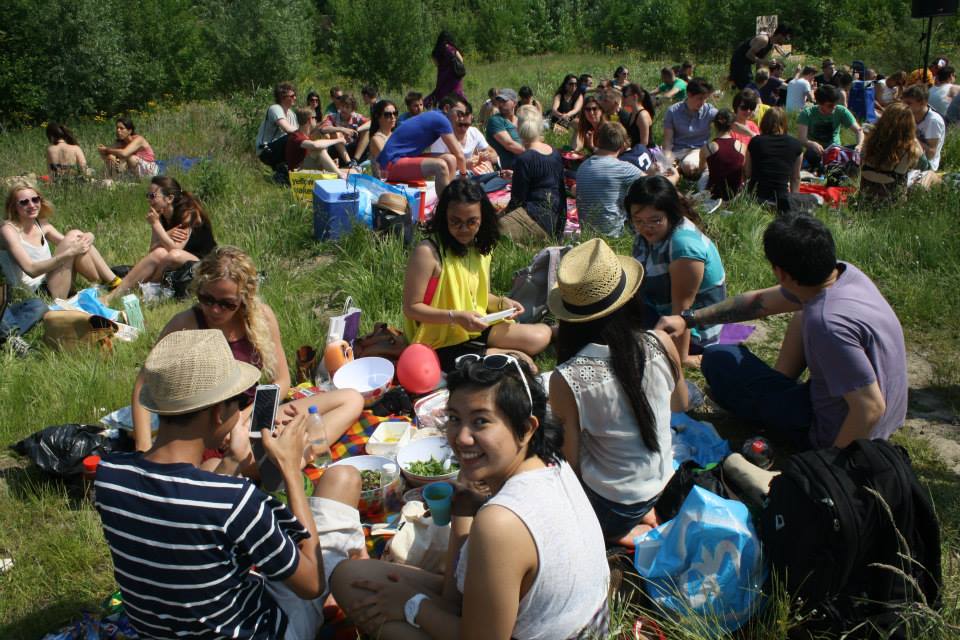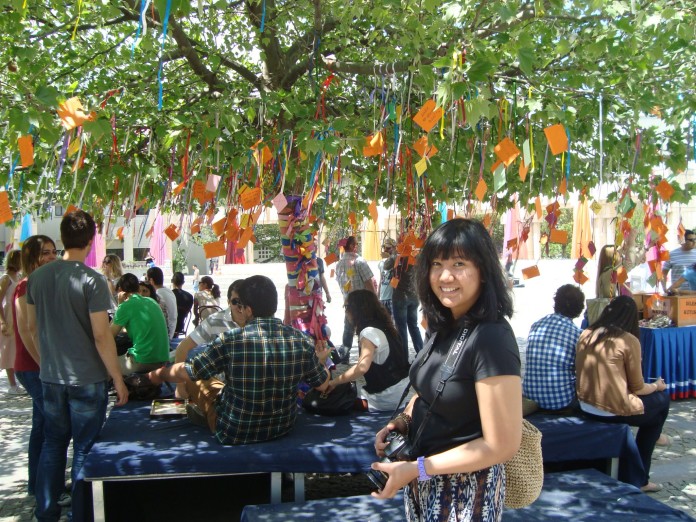I had always dreamed of studying abroad. After graduating from high school in Bandung, I set my goal to study at Bilkent University, Turkey. I made sure that I was prepared to ace the entrance test, practiced my English, and even took a summer course to study Turkish. I was very excited when I learned that I was accepted at Bilkent. But when I went to the first day of orientation, I was caught off guard: nobody ever taught me how to socialize and make friends in an international setting. There I was, in a foreign country, as a foreigner, standing with a group of strangers, being awkward.
What do I say? Wow, that girl looks so confident! Oh, they already knew each other from high school. Maybe I should talk to that one other Asian girl. Should I smile?
As anxiety rushed to fill my head, a girl walked up to me and offered her hand, “Hi, my name is Seda, are you a freshman too?”
“Hi, yes, my name is Chani, I’m from Indonesia. How about you?”
“I’m Turkish, but I grew up in the United States!”
I was very nervous and really hoped she didn’t find me boring and leave. Thankfully, she didn’t. We talked for several minutes and other students started to join our conversation. We formed a group and spent the rest of the day together. By the end of the day, I added five new contacts on my phone. During the bus ride home, I realized: everybody was just as nervous as I was.
It has been almost a decade since that day, and I have learned a lot about navigating awkward social situations throughout the years. In my five years of higher education overseas, I have made many friends — some are still my friends and some I may never see again. I have learned that I am usually better off putting myself out there in awkward social situations rather than staying at home. Moreover, the skills I learned overseas proved to be very useful when I returned back to Indonesia to pursue my career. A good networking skill has opened me up to multiple opportunities, and even got me new friends. So, in this article, I would like to share some tips on how to navigate networking events, especially in international settings.
Smile and greet the people around you
In any social event, smiling would always be the best way to invite people to talk to you. When you smile genuinely, you communicate to others that you are at ease and open to socializing. Imagine yourself in a room full of strangers, who would you approach: the friendly looking person, or the person busy looking on their phone? Of course the friendly looking one. And trust me, a simple smile goes a long way.
During the orientation period of my master’s program in Singapore, I approached a man who looked friendly in an unfamiliar crowd — he was smiling and seemed genuinely interested to get to know another fellow student. We ended up spending the day together, becoming good friends, and five years later, he became my husband! Okay, I know that this is a one-in-a-million kind of situation, but the point stands: a smile is a gateway to infinite possibilities.
What if nobody greets you even when you are smiling? Well, clear your throat and say hi to other people! I know it sounds scary, but what is the worst thing that can happen? In most cases, people will greet you back and either start a conversation with you or invite you to the conversation they are already having with another person. If the person does not greet you back, then don’t waste your time and find other people to hang out with — they are most probably not a nice person anyway.

Make genuine connections
Throughout the years, I have learned that connections that last are those that are genuine. When you’re talking to someone new, it is important to remember to treat them as a human being. Remember their names. Take hints from their body language. Actually listen to what they have to say. Many people (including younger me) listen to what other people say just to think of the next thing to say. But they are not actually listening.
The first step to fostering genuine connections is active listening, that is when you genuinely try to connect and empathize with the other person. Set your judgments aside and try to understand what the other person is communicating. Active listening would leave a better impression on you and helps in building good rapport.
I learned this the hard way. Early on during my study in Turkey, I was so eager to prove myself — to show that I was smart and interesting. I had a tendency to one-up the other person. For example, when my friend told me that she had a long commute to campus, instead of sympathizing with her, I immediately replied that my commute was even worse. I kept doing that until, thankfully, a good friend called me out on that behavior.
What if the other person is not much of a talker? Then, it’s your turn to ask open-ended questions, such as “Where are you from?” or “What do you think of the food?”. You can also take this opportunity to establish what you have in common with the other person. For example, if both of you are international students, then ask about the reason they chose to study in that country.
If the other person seems shy, then it would help for you to also open up. Being open and vulnerable to someone would invite them to reciprocate. For example, if the other person only answers your questions with short sentences, then try sharing your own feelings or experiences with them. It would signal to them that you are interested to open up with them about that topic.
I actually landed on a job this way, by establishing a genuine connection. One night, I attended a business networking event in Jakarta, when a girl started performing Let It Go on stage. After she sang, I commented to an American man standing next to me (a total stranger) how beautiful her performance was. He agreed and we started to discuss our favorite Disney songs for around ten minutes. We got to know each other and exchanged contacts. We kept in contact and a year later he offered me a senior position at his fintech start-up.

You are interesting, your opinion matters
In many international social gatherings, I have observed that there is a tendency for people from East Asia, and specifically Indonesia, to avoid participating in free-roaming networking sessions, such as buffet dinners or cocktail parties. Of course, this is a generalization and I know many East Asians and Indonesians who thrive in these settings. But as someone who was born and raised in Indonesia, I understand why international — especially western-style — networking sessions are scary.
In East Asia, social gatherings such as college orientation are usually organized as a curated group activity. There is usually a group outing, a team challenge, or a karaoke session in a contained environment. It is very important for our society to establish “group-ness” instead of promoting oneself. However, western-style networking sessions have become the international norm of networking. So, as an aspiring global citizen, it would be important for you to get used to those as well.
From my experience, as Indonesians, our default position when speaking with someone new is to avoid disagreement. Back in Turkey, I used to either agree to the other person’s opinion or stay quiet when I disagree. Back then I thought, disagreement equals conflict. But actually, you would make a much more interesting conversation partner when you have your own opinions and express your own point of view. If your opinion is different from the consensus, it actually makes you more interesting to your peers. Your unique point of view would enrich the conversation. Just make sure that you are respectful and your comments are not made in bad faith.
In the earlier story of how I met the start-up founder, we actually disagreed on our favorite Disney songs. I was so excited to tell him that I loved the songs from Moana, while he said that he preferred songs from classic Disney movies. We then went on to discuss our opinions on our favorite movies and songs. Even though we disagreed, we discovered our mutual love for Disney movies. I also learned new things from his point of view.
Always go with a mindset that you are interesting. The fact that you are there, in the social gathering, already warrants that you have a unique story worth telling. For example, if you are attending an international conference in Japan, that means you have an interesting background story on how you end up there. Maybe it is because of your interest in Japanese culture, or the topic of the conference. Maybe you won a scholarship to go there. Don’t be afraid to own up to it!
I hope these tips encourage you to go to the awkward social event you have been dreading. Remember: other people are probably feeling as awkward as you are. Embrace it!

***
Photos provided by the author











